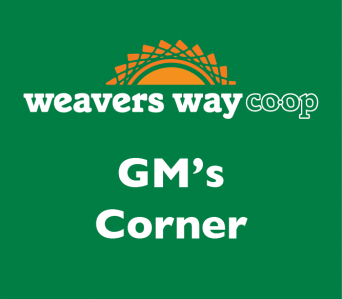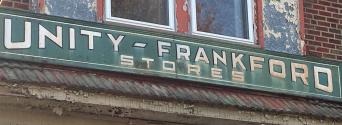
GM's Corner: The Co-op Concept That Worked for Mom & Pop
MEMBER FORUMS REBOOT
Over the last couple of years, we’ve held a dozen or so “member forums,” opportunities for members to get together with me, the Co-op’s general manager, to talk shop, ask questions, or air grievances. These have been great fun, but the last few have been pretty sparsely attended, so I’d like to try a different approach.
Starting in December, we’ll hold a series of three member forums focusing on specific issues. On Wednesday, Dec. 13, we’ll talk about our working member program. On Wednesday, Jan. 17, we’ll focus on our dependency on plastic packaging. On Thursday, Feb. 15, we’ll tackle the Co-op’s product philosophy.
For each of these forums, I’ll begin with a brief presentation and then open it up for general discussion.
If these subjects are of interest to you, please join me for an hour or so to give your thoughts and to hear from your fellow member-owners.
— Jon Roesser
Open Member Forum
“Working Membership/ Member Engagement”
Wednesday, Dec. 13, 6-7 p.m.
Community Room
555 Carpenter Lane
For more info and to RSVP: www.weaversway.coop/12.13.forum
or contact Membership at members@weaversway.coop or 215-843-2350, ext. 118.
"What’s a co-op?”
It’s a question we get asked all the time around here, especially in the last few weeks, as nearly a thousand new member-owners have joined since the opening our Ambler store, many of them experiencing Weavers Way, and the cooperative business model, for the very first time.
Variations on this question include “What’s the deal with this place?” “Can I shop here?” and, my personal favorite, “Are you guys communists?”
Over the years, I’ve tried a variety of responses to “What’s a co-op?” some effective, some less so. But I’ve found the best way to prevent my audience’s eyes from glazing over is to give a familiar example.
These days my favorite example, one unique to our city, is the old Unity-Frankford grocery.
Philadelphians of a certain age may remember Unity-Frankford stores, which thrived through the middle of the 20th century, and even if you don’t, you’ve probably seen their signs, many of which have stubbornly survived on street corners throughout the city and suburbs. There’s one at Chew and Meehan in East Mt. Airy.
These were not consumer co-ops like Weavers Way. These were for-profit mom-and-pop stores (the profit providing the livelihood for Mom and Pop).
Each Unity-Frankford store was independently owned. All were small — most were no bigger than Weavers Way’s Carpenter Lane store — and the individual owners identified a common need: centralized warehousing.
Pooling their resources, they purchased a warehouse, on Unity Street in Frankford. Their cooperatively owned warehouse operation dealt with suppliers, maintained inventory and negotiated volume pricing with farmers, food producers and wholesalers.
They even developed a private label, the “Unity” brand, so people shopping in any of their stores would see a familiar brand associated exclusively with Unity-Frankford, one that assured quality and value.
The warehouse freed the grocers from having to deal with suppliers directly and allowed them to concentrate on running their stores. It saved them time, money and aggravation.
People identifying a common need, joining forces to achieve that need: That’s a co-op.
Simple. And yet it’s puzzling that this simple concept has become so foreign to so many.
Has our society’s emphasis on the individual clouded our ability to understand the value of mutual benefit?
Entrepreneurs and their for-profit businesses are the foundation of Weavers Way’s supply chain: They provide us with much of the local produce, bread, meat, milk, cheese, coffee and specialty products we sell. We pay them a fair price for their products, which allows them to survive and hopefully thrive. (Which is why these products tend to cost more, a subject for another column!)
Some of our suppliers have grown to be quite large. Others have purposely stayed small. Some of their owners have grown rich. For others, it’s still a labor of love. We’re proud to be business partners with all of them.
We teach our kids to do well in school so they can get into a good college so they can get a good-paying job so they can support themselves. If they do well, we deem them “successful.”
I don’t begrudge individual success, and certainly if we raise our kids right they’ll see value in helping others and work towards bettering their communities.
But the quest for individual success need not be to the exclusion of shared success.
I think those Unity-Frankford folks got it right. They were entrepreneurs too, in business to make a profit, to build a better life for themselves and their children. They happily embraced the American way — many Unity-Frankford owners were first- or second-generation Americans — and took charge of their own financial destiny.
But they also saw the value of cooperation, of seeing their fellow grocers not as competitors, but as fellow entrepreneurs. Instead of creating a whole chain of stores, owned by a wealthy few, they created a cooperative that behaved like a chain, but benefited many, many owners.
It’s a mind-set that I believe is due for resuscitation. A society that embraces nothing but a dog-eat-dog, winner-take-all, in-it-for-me approach is bound to become ruthless, uncaring, selfish and, ultimately, immoral.
No thanks. There’s power in unity.
See you around the Co-op.

